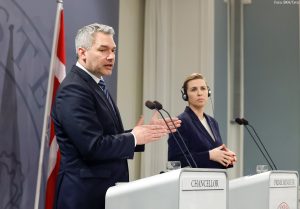Austria, Sweden and Denmark are talking about forming an alliance to press Brussels to tighten migration controls for those wishing to enter the EU.
Chancellor Karl Nehammer of Austria raised the issue during his recent visits to Copenhagen and in Stockholm, where he met with Swedish Prime Minister Ulf Kristersson on 30 March.
In a tweet following that visit, Nehammer noted that since Sweden currently holds the EU presidency, Austria regards it as a key partner “in the fight against illegal migration”.
Thanks to measures taken at the European level, “we have trodden the asylum brake harder” but now they must be implemented “fast.”, Nehammer declared. Vienna and Stockholm reportedly hope to collaborate more closely on economic issues as well as ensuring that Europe’s migration policies evolve to meet the changing situation.
PM Kristersson, as leader of the liberal-conservative Moderate Party, heads the coalition government that came to power last October. It depends on the far-right, anti-migration Sweden Democrats for votes, along with two other centre-right parties. Migration, criminality and integration were the featured issues of that election, in which the Sweden Democrats won 73 seats, making them second to the Social Democratic party, which has 107 seats. Kristersson’s party is the third largest party with 68 seats in parliament.
Nehammer was in Copenhagen the next day, where he commended the “strong and reliable partnership” between the two countries, which he hoped would continue “on both a bilateral and EU level”, after meeting Denmark’s social-democrat Prime Minister Mette Frederiksen. Her government has also talked tough on migration, with the PM claiming that the EU asylum system is “broken”.

[Austrian Chancellor Karl Nehammer with Denmark’s Prime Minister Mette Frederiksen. Credit: Karl Nehammer @karlnehammer ]
Just recently, Denmark spoke in favor of building more fences to protect Europe’s external borders. Denmark and Sweden have had bilateral border controls between their countries since 2016. Emulating the UK’s example, Denmark has even considered sending asylum seekers to Rwanda.
Meanwhile, Euractiv reports that Chancellor Nehammer has told his electorate that he proposes making Austria a less attractive destination for migrants, “by cutting social support payments in a migrant’s initial years following their arrival. “Denmark, according to the European portal, already has similar policies “in place”.
After meeting with Nehammer, Danish PM Mette Frederiksen declared: “We are like-minded countries on many issues, including migration”. Nehammer, Euractiv reports, was even more emphatic, declaring: “we are allies in fighting illegal migration”.Frederiksen told reporters that the EU needs to “remove incentives to embark on dangerous journeys to Europe”.
When EU leaders meet in Brussels in June, migration policies will be on the agenda. Denmark and Austria have already written to the European Commission asking that it take “urgent action”.
In February 2023, Denmark and Austria joined the leaders of Lithuania, Greece, Slovakia, Estonia, Latvia and Malta to address a joint letter to EC President Ursula von der Leyen and Council President Charles Michel urging the EU to “tackle the problem of irregular migration to the EU”. According to a press release, the EU leaders stated that “irregular migration is once again becoming one of the EU’s most pressing issues, with national and local authorities confronted with a sharp increase in the number of migrants crossing borders illegally and in the number of asylum applications.”.
The alliance called on the EU to make its external borders more effective, claiming the current asylum system and “the extremely low rate of return are pull factors…[that encourage] life-threatening journeys to Europe.” The EU, they said, should address the “root causes of irregular migration by promoting economic and social opportunities in countries of origin and key host and transit third countries.”
According to the press release, €6 billion has been earmarked in the EU budget for the protection of its external borders for the period 2021-2027.

